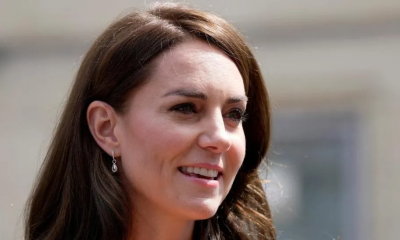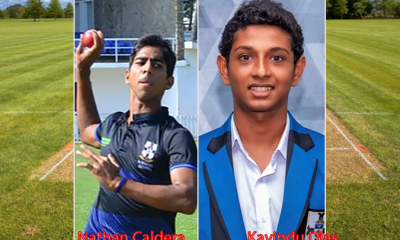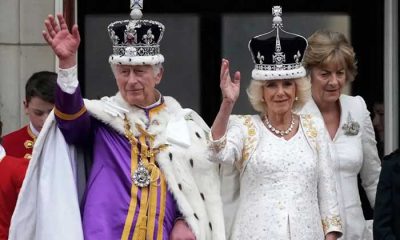Foreign News
Kate, Princess of Wales: I am having cancer treatment

The Princess of Wales says she is in the early stages of treatment after a cancer diagnosis.
In a video statement, Catherine says it was a “huge shock” after an “incredibly tough couple of months”. But she sent a positive message, saying: “I am well and getting stronger every day.”
Details of the cancer have not been disclosed, but Kensington Palace says it is confident the princess will make a full recovery.
The video statement from Catherine explains that when she had abdominal surgery in January, it was not known that there was any cancer.
“However tests after the operation found cancer had been present. My medical team therefore advised that I should undergo a course of preventative chemotherapy and I am now in the early stages of that treatment,” said the princess.
The chemotherapy treatment began in late February. The palace says it will not be sharing any further private medical information, including the type of cancer.
The princess, 42, said she was thinking of all those who have been affected by cancer, adding: “For everyone facing this disease, in whatever form, please do not lose faith or hope. You are not alone.”
Catherine said recovery from her surgery in January, for a condition which has not been revealed, had taken time and the priority was now reassuring her family. “William and I have been doing everything we can to process and manage this privately for the sake of our young family.” The princess added: “It has taken us time to explain everything to George, Charlotte and Louis in a way that is appropriate for them, and to reassure them that I am going to be ok.”
She said the family now needs “some time, space and privacy”.
The King and Queen had been informed of the news about the princess’s health prior to Friday’s announcement – and King Charles himself has also been undergoing treatment for cancer.
King Charles and Catherine were briefly treated at the London Clinic private hospital at the same time – Catherine had her abdominal surgery there and the King was admitted for a “corrective procedure” for an enlarged prostate.
A Buckingham Palace spokesperson said the King was “so proud of Catherine for her courage in speaking as she did”.
After their time in hospital together, he has “remained in the closest contact with his beloved daughter-in-law throughout the past weeks”.
Prince Harry and Meghan sent a message saying: “We wish health and healing for Kate and the family, and hope they are able to do so privately and in peace.”
Catherine and Prince William are now not expected to appear with the Royal Family on Easter Sunday, and there won’t be any early return to official duties for the princess.
Kensington Palace also said Prince William’s sudden absence from a memorial service on 27 February was because of the discovery of Catherine’s cancer diagnosis.
The couple have faced intense public speculation and a social media frenzy about her health, since her operation in January. She has not attended any official events since Christmas.
In her video statement, she spoke about the support from her family: “Having William by my side is a great source of comfort and reassurance too. “As is the love, support and kindness that has been shown by so many of you. It means so much to us both.”
Kensington Palace said the video of the princess was filmed on Wednesday by BBC Studios, the production arm of the BBC.
In a statement, BBC News said: “Along with other media, BBC News was briefed by Kensington Palace on the announcement this afternoon.”
There have been calls for privacy from the palace after weeks of speculation and conspiracy theories about the royal couple. This had intensified after the withdrawal by photo agencies of a photograph of the princess for Mother’s Day, on 10 March, because of concerns over digital alterations, for which the princess subsequently apologised.
There were also social media theories over video footage showing Prince William and Catherine shopping in Windsor earlier this week.
Prime Minister Rishi Sunak said on Friday Catherine had shown “tremendous bravery” with her statement, wishing her a “speedy recovery”. He said: “In recent weeks she has been subjected to intense scrutiny and has been unfairly treated by certain sections of the media around the world and on social media. “When it comes to matters of health, like everyone else, she must be afforded the privacy to focus on her treatment and be with her loving family.”
Labour leader Sir Keir Starmer said his thoughts were with the Royal Family, adding he was “heartened” by Catherine’s “optimistic tone and her message of faith and hope”. He said: “Any cancer diagnosis is shocking. But I can only imagine the added stress of receiving that news amid the lurid speculation we’ve seen in recent weeks.” William and Catherine are “entitled to privacy and, like any parents, will have waited to choose the right moment to tell their children”.
Meanwhile, US President Joe Biden said on X, formerly Twitter, that he was joining “millions around the world in praying” for Catherine’s “full recovery”.
Professor Pat Price, an oncologist and founder of the Catch Up With Cancer campaign, praised the princess for speaking out “so openly and frankly”. “As was the case with the King’s diagnosis, her doing so will no doubt give many more people that vital prompt to get themselves checked and give others affected by cancer more confidence to speak about their own experience.
“This announcement is a stark and shocking reminder that cancer is no respecter of age or social status.
(BBC)
Foreign News
Rembrandt painting worth millions rediscovered after 65 years

A long lost painting by Rembrandt has been rediscovered and authenticated by experts, after its whereabouts were unknown for decades.
Rembrandt’s Vision of Zacharias in the Temple, from 1633, was excluded from a list of the Dutch master’s works in 1960, and disappeared after being sold to a private collector the following year.
But it resurfaced when its owners presented it for tests at the Rijksmuseum in Amsterdam, which undertook a two-year examination.
“When I saw it in our studio when it was restored, I was immediately struck by the incredible power it has,” Rijksmuseum director Taco Dibbits said.
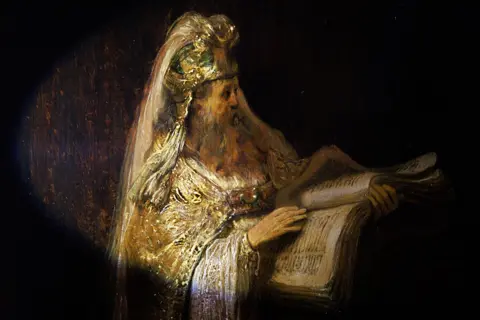
The Rijksmuseum receives many emails from people asking for information about paintings they have inherited or bought, Dibbits said. In this case, they knew it could be something special.
“It came to us via email and one of our curators thought, this is really an interesting image, we’ve known about the painting for over 100 years but we’ve never seen it.”
The museum confirmed the authenticity after studying the paints, which fit with those used by Rembrandt during that period, and the painting technique and build-up of layers, which are also comparable with his other early works.
The signature is original and the wooden panel dates from the correct period, the researchers said.
“Materials analysis, stylistic and thematic similarities, alterations made by Rembrandt, and the overall quality of the painting all support the conclusion that this painting is a genuine work,” the gallery said.
The painting has all the hallmarks of Rembrandt at the “peak” of the early part of his career, Dibbits said.
“It’s very high quality. Sometimes with Rembrandt’s portraits you feel that he’s producing in quantity, but with this painting you really feel that he dedicated his soul to it.”
The museum will put the painting on public view from Wednesday.
Its value is not known, but the world record auction price for a Rembrandt painting is £20m, set in 2009.
Other Rembrandt paintings to be sold in recent years include one for £8.6m in 2019, a self-portrait for £12.6m in 2020, and another once-lost Rembrandt work for £11m in 2023.
In 2015, a Rembrandt painting was given a price tag of £35m by the UK government after being sold privately.
Last month, a drawing of a lion by the artist sold for $18m (£13m).
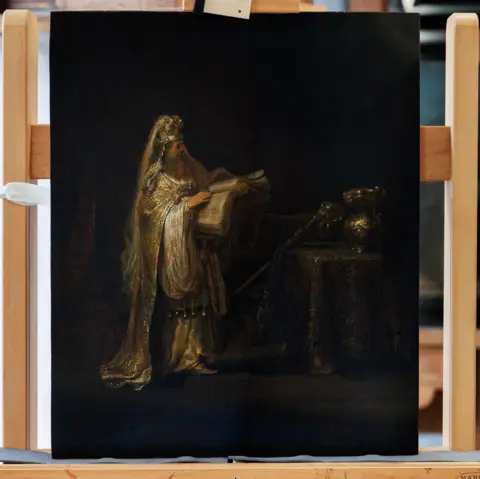
[BBC]
Rembrandt was 27 when he created the painting, which depicts the Biblical scene when priest Zacharias is told by the Archangel Gabriel that despite their age, he and his wife will have a son, John the Baptist.
The museum said Rembrandt had given the Biblical story an innovative twist. Instead of depicting the Archangel Gabriel visibly, he only suggested his presence. In doing so, he departed from established visual traditions and introduced a new way of representing this subject.
Rembrandt deliberately chose the decisive moment, just before Gabriel reveals his true identity.
It is one of the few history paintings Rembrandt created during this period. At the time, he was primarily producing portraits, which were highly lucrative.
[BBC]
Foreign News
War photographer Paul Conroy dies as tributes paid
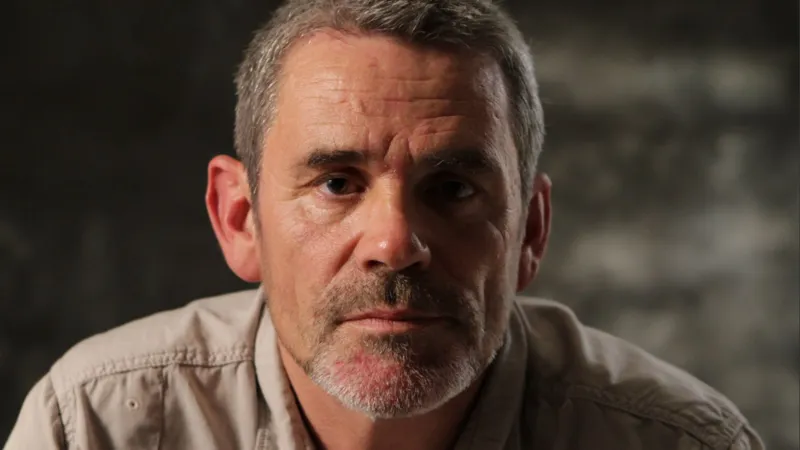
Tributes have been paid to the war photographer Paul Conroy who has died at the age of 61.
He covered conflicts around the world and was wounded in the Syrian army’s bombardment of Homs, which killed his Sunday Times colleague Marie Colvin in 2012.
Their fateful assignment was depicted in the 2018 movie A Private War, with the actor Jamie Dornan playing Conroy.
The Liverpool-born photographer died from a heart attack on Saturday in Devon, where he had lived, his brother Alan told the BBC.
“He did all his life what he wanted to do to make a difference – he found great pleasure in exposing wrongs,” Alan added.
BBC newsreader Clive Myrie posted that he was “utterly devastated” by the news, describing Conroy as “a wonderful photojournalist and a wonderful human being”.
“I counted him as a friend and a decent, principled and kind man. My brutha you will be sorely missed. RIP”
Lindsey Hilsum, international editor at Channel 4, added: “All of us who knew and loved him are devastated.”
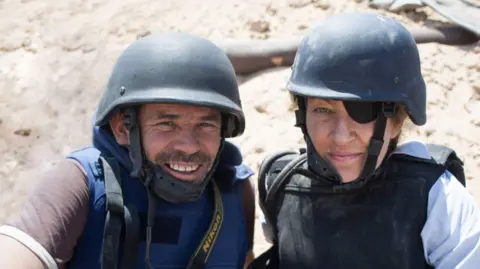
Conroy also spent seven years with the Royal Artillery as a soldier before becoming a professional photographer and was a trustee of the Frontline Club for media professionals, diplomats and aid workers.
Its founder Vaughan Smith, who was also in the Army, said: “He was one of the characters – those people who stand out because everybody adores them and they make you feel better.”
The 2018 documentary Under the Wire was made about Conroy’s escape from the 2012 bombardment of a makeshift media centre in Homs, where his colleagues Marie Colvin and Remi Ochlik were killed.
Referring to the Syrians who were killed in the area, he said: “These beautiful people who were being slaughtered, I wanted to tell their story.”
He only realised how badly injured he was when he returned to the UK.
“Obviously I knew I had a huge hole in the back of my leg,” he said.
“But in London I found out I also had a great big piece of shrapnel wedged under my kidneys. I had 23 operations on my leg and others on my abdomen and back. I was in hospital for five months.”
Conroy worked in Libya and Ukraine and had recently returned from an assignment in Cuba.
He also took photos for the British singer Joss Stone and wrote music with her.
She said she was “so grateful to have known him and honoured to call him my friend”.
“I wouldn’t be the person I am today without Paul. Paul Conroy was a legend. A wonderful person through and through. Always standing up for what was right. Always there for those in need.”
He leaves behind a wife, three sons and grandchildren.
[BBC]
Foreign News
Iran begins 40-day mourning after Khamenei killed in US-Israeli attack
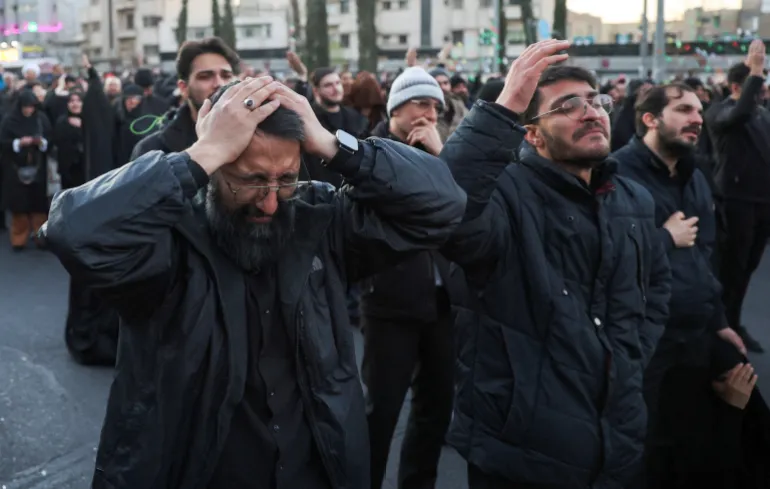
Iran has begun 40 days of mourning after Supreme Leader Ayatollah Ali Khamenei was killed in ongoing attacks by the United States and Israel, according to Iranian state media.
Top security officials were also killed in Saturday’s strikes, along with Khamenei’s daughter, son-in-law and grandson. The killings mark one of the most significant blows to Iran’s leadership since the 1979 Islamic revolution.
President Masoud Pezeshkian condemned the killing as “a great crime”, according to a statement from his office. He also declared seven days of public holidays in addition to the 40-day mourning period.
Reporting from Tehran, Al Jazeera’s Tohid Asadi said people were pouring into the streets of the capital following the news of Khamenei’s killing.
“There will be expected ceremonies,” he said, noting they would likely take place amid continuing bombardment across the country.
Protests denouncing Khamenei’s killing were also reported elsewhere, including Shiraz, Yasuj and Lorestan.
Footage aired by Iranian state media showed supporters mourning at the shrine of Imam Reza in Mashhad, with several people seen crying and collapsing in grief.
The killing also led to protests in neighbouring Iraq, which declared three days of public mourning. In Baghdad, protesters confronted security forces in the heavily fortified Green Zone, which houses Iraqi government buildings and foreign embassies.
Videos verified by Al Jazeera showed demonstrators waving flags and shouting slogans, with witnesses saying some were attempting to mobilise towards the US Embassy. Footage also showed protesters blocking vehicles at a roundabout near one of the entrances to the area.

There was also a protest in the Pakistani city of Karachi, where footage, verified by Al Jazeera, showed people setting fire to and smashing the windows of the US consulate.
However, there have also been reports of celebrations in Iran, with the Reuters news agency quoting witnesses as saying some people had taken to the streets in Tehran, the nearby city of Karaj and the central city of Isfahan.
Meanwhile, the official IRNA news agency reported that a three-person council, consisting of the country’s president, the chief of the judiciary, and one of the jurists of the Guardian Council, will temporarily assume all leadership duties in the country. The body will temporarily oversee the country until a new supreme leader is elected.
Khamenei assumed leadership of Iran in 1989 following the death of Ayatollah Ruhollah Khomeini, who had led the Islamic revolution a decade earlier.
While Khomeini was regarded as the ideological force behind the revolution that ended the Pahlavi monarchy, Khamenei went on to shape Iran’s military and paramilitary apparatus, strengthening both its domestic control and its regional influence.
Meanwhile, the Islamic Revolutionary Guard Corps (IRGC) pledged revenge and said it had launched strikes on 27 bases hosting US troops in the region, as well as Israeli military facilities in Tel Aviv.
[Aljazeera]
-

 Opinion5 days ago
Opinion5 days agoJamming and re-setting the world: What is the role of Donald Trump?
-

 Features5 days ago
Features5 days agoAn innocent bystander or a passive onlooker?
-

 Features2 days ago
Features2 days agoBrilliant Navy officer no more
-

 Features6 days ago
Features6 days agoRatmalana Airport: The Truth, The Whole Truth, And Nothing But The Truth
-

 Opinion2 days ago
Opinion2 days agoSri Lanka – world’s worst facilities for cricket fans
-

 Business6 days ago
Business6 days agoIRCSL transforms Sri Lanka’s insurance industry with first-ever Centralized Insurance Data Repository
-

 Business5 days ago
Business5 days agoAn efficacious strategy to boost exports of Sri Lanka in medium term
-

 Features3 days ago
Features3 days agoOverseas visits to drum up foreign assistance for Sri Lanka


